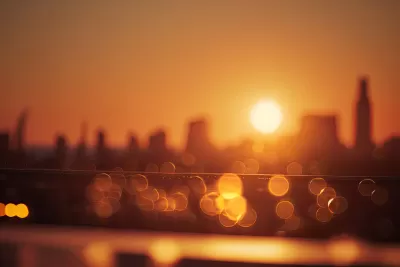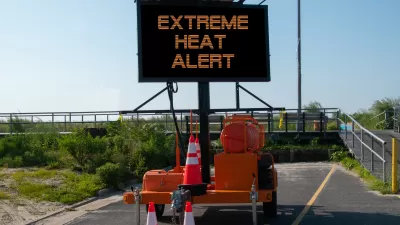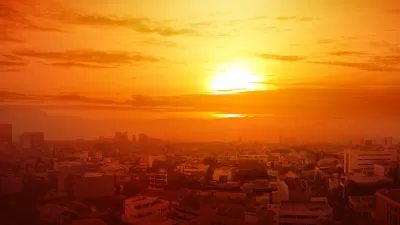As heat waves intensify, cities are seeking out heat mitigation techniques that can be applied widely and benefit entire neighborhoods.

With extreme heat becoming a severe health risk in more U.S. cities, local governments are looking for ways to mitigate its impacts at larger scales, reports Ysabelle Kempe in Smart Cities Dive. “Five cities — Atlanta, Boston, Dallas, New Orleans and Columbia, South Carolina — will participate in a three-year project to scale up the adoption of surfaces that reduce urban heat, the nonprofit Smart Surfaces Coalition announced Thursday.”
The project is aimed at reducing barriers to scaling up heat mitigation projects to make a difference at the neighborhood level. “The coalition’s analysis of citywide ‘smart surfaces’ adoption in Baltimore found that the strategy could cool the city by 5 degrees Fahrenheit and provide more than $10 in cost savings for every $1 spent.”
Kurt Shickman, director of extreme heat initiatives at the Adrienne Arsht-Rockefeller Foundation Resilience Center, explains the challenges, saying, “a city may not be able to plant trees where they would provide the most value if the land is private property or owned by, say, a water utility or public transportation authority. Shickman suggested that cities could develop incentives or even regulation to encourage cooling changes to the built environment.”
The Smart Surfaces Coalition says it can fund ten projects and welcomes applications from more cities.
FULL STORY: These 5 cities aim to cool down by scaling up ‘smart surfaces’ in coming years

Alabama: Trump Terminates Settlements for Black Communities Harmed By Raw Sewage
Trump deemed the landmark civil rights agreement “illegal DEI and environmental justice policy.”

Planetizen Federal Action Tracker
A weekly monitor of how Trump’s orders and actions are impacting planners and planning in America.

The 120 Year Old Tiny Home Villages That Sheltered San Francisco’s Earthquake Refugees
More than a century ago, San Francisco mobilized to house thousands of residents displaced by the 1906 earthquake. Could their strategy offer a model for the present?

Ken Jennings Launches Transit Web Series
The Jeopardy champ wants you to ride public transit.

BLM To Rescind Public Lands Rule
The change will downgrade conservation, once again putting federal land at risk for mining and other extractive uses.

Indy Neighborhood Group Builds Temporary Multi-Use Path
Community members, aided in part by funding from the city, repurposed a vehicle lane to create a protected bike and pedestrian path for the summer season.
Urban Design for Planners 1: Software Tools
This six-course series explores essential urban design concepts using open source software and equips planners with the tools they need to participate fully in the urban design process.
Planning for Universal Design
Learn the tools for implementing Universal Design in planning regulations.
Clanton & Associates, Inc.
Jessamine County Fiscal Court
Institute for Housing and Urban Development Studies (IHS)
City of Grandview
Harvard GSD Executive Education
Toledo-Lucas County Plan Commissions
Salt Lake City
NYU Wagner Graduate School of Public Service





























